 W
WLaw of the sea is a body of international law governing the rights and duties of states in maritime environments. It concerns matters such as navigational rights, sea mineral claims, and coastal waters jurisdiction.
 W
WThe United Nations Convention on the Law of the Sea (UNCLOS), also called the Law of the Sea Convention or the Law of the Sea Treaty, is an international agreement that establishes a legal framework for all marine and maritime activities. As of June 2016, 167 countries and the European Union are parties.
 W
WAll the Fish in the Sea: Maximum Sustainable Yield and the Failure of Fisheries Management is a 2011 book by Carmel Finley. The book argues that the policies for international fishing and whaling management were essentially locked in place by 1958, and that the United States played a large role in setting them. In the development of the international law covering fisheries, the US supported laws that would protect the US tuna and salmon fisheries while limiting the ability of other nations, and Japan in particular, to fish in US waters. The book thus ties fisheries management inseparably with Cold War politics.
 W
WThe baselines of the Philippines are the set of geodesic lines completely encircling the Philippine archipelago from where the maritime entitlements of the country are measured from. It was first established in 1961 by an act of the Congress of the Philippines which was further amended in April 2009 to optimize and conform it to the United Nations Convention on the Law of the Sea, which the Philippines is a signatory to. A total of 101 basepoints providing for 100 baselines were identified under Republic Act No. 9522, which identified Amianan Island as the northernmost, Frances Reef as the southernmost, Pusan Point as its easternmost and the Balabac Great Reef as the westernmost points of the main Philippine archipelago.
 W
WThe Benham Rise, officially known as Philippine Rise, is an extinct volcanic ridge located in the Philippine Sea approximately 250 kilometers (160 mi) east of the northern coastline of Dinapigue, Isabela. The rise has been known to the people of Catanduanes as Kalipung-awan as early as the precolonial era of the Philippines, which literally means "loneliness from an isolated place".
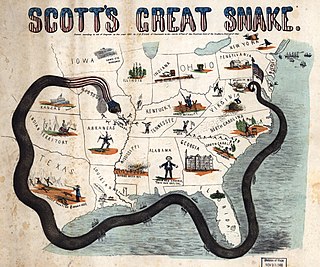 W
WA blockade is the act of actively preventing a country or region from receiving or sending out food, supplies, weapons, or communications, and sometimes people, by military force. A blockade differs from an embargo or sanctions, which are legal barriers to trade. It is also distinct from a siege in that a blockade is usually directed at an entire country or region, rather than a fortress or city and the objective may not always be to conquer the area.
 W
WThe Book of the Consulate of the Sea or Book of the Consulate of Sea is a compendium of maritime law that governed trade in the Mediterranean for centuries. Of Catalan origin, it was translated into many languages and served as the basis for current international maritime law.
 W
WThe Bureau of Oceans and International Environmental and Scientific Affairs (OES) is a functional bureau within the United States Department of State. The Assistant Secretary of State for Oceans and International Environmental and Scientific Affairs coordinates a suite of portfolios related to oceans, environmental, polar, scientific, fisheries, wildlife, conservation, and natural resource and health affairs that affect U.S. foreign policy interests. The Assistant Secretary reports to the Under Secretary of State for Economic Growth, Energy, and the Environment.
 W
WCartel ships, in international law, are ships employed on humanitarian voyages, in particular, to carry communications or prisoners between belligerents. They fly distinctive flags, including a flag of truce. Traditionally, they were unarmed but for a single gun retained for signalling purposes. Cartel ships were used on the basis of intergovernmental agreements, which were called 'cartels' between the 17th and the 19th century.
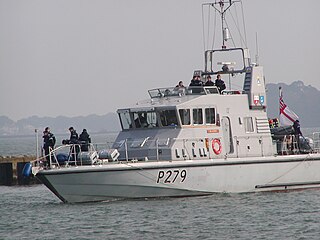 W
WThe 1993 Cherbourg incident were a series of maritime incidents which took place from 26 March to 2 April 1993 between the British Royal Navy and French fishermen as a result of a fishing rights dispute in and around the Channel Islands waters.
 W
WCode letters or ship's call sign were a method of identifying ships before the introduction of modern navigation aids and today also. Later, with the introduction of radio, code letters were also used as radio call signs.
 W
WCommon heritage of mankind is a principle of international law that holds that defined territorial areas and elements of humanity's common heritage should be held in trust for future generations and be protected from exploitation by individual nation states or corporations.
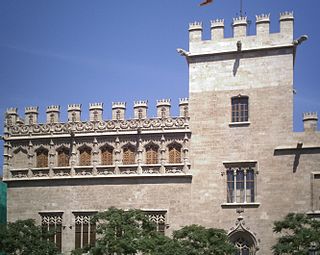 W
WThe Consulate of the Sea was a quasi-judicial body set up in the Crown of Aragon, later to spread throughout the Mediterranean basin, to administer maritime and commercial law. The term may also refer to a celebrated collection of maritime customs and ordinances in Catalan language, also known in English as The Customs of the Sea, compiled over the 14th and 15th centuries and published at Valencia in or before 1494.
 W
WA continental shelf is a portion of a continent that is submerged under an area of relatively shallow water known as a shelf sea. Much of these shelves were exposed by drops in sea level during glacial periods. The shelf surrounding an island is known as an insular shelf.
 W
WDay shapes are mast head signals visually indicating the status of a vessel to other vessels on navigable waters during daylight hours whether making-way, anchored, or aground. These signals consist of a set of simple geometric shapes—ball, cylinder, cone, and diamond—that are displayed, hung from a mast, in a prescribed manner to indicate a vessel's operational status; some of these signals may be somewhat involved. The meanings of the shapes are defined by the International Regulations for Preventing Collisions at Sea (ColRegs).
 W
WSir Malcolm David Evans, is an English legal scholar. He is Professor of Public International Law at the University of Bristol. He has worked extensively on human rights issues for numerous international bodies and NGOs and has served as a member and Chair of the United Nations Subcommittee for the Prevention of Torture.
 W
WAn exclusive economic zone (EEZ), as prescribed by the 1982 United Nations Convention on the Law of the Sea, is an area of the sea in which a sovereign state has special rights regarding the exploration and use of marine resources, including energy production from water and wind. It stretches from the baseline out to 200 nautical miles (nmi) from the coast of the state in question. It is also referred to as a maritime continental margin and, in colloquial usage, may include the continental shelf. The term does not include either the territorial sea or the continental shelf beyond the 200 nautical mile limit. The difference between the territorial sea and the exclusive economic zone is that the first confers full sovereignty over the waters, whereas the second is merely a "sovereign right" which refers to the coastal state's rights below the surface of the sea. The surface waters, as can be seen in the map, are international waters.
 W
WThe Exclusive Economic Zone of Cyprus covers around 30,000 square miles and is divided into 13 exploration squares. The process of creating exclusive economic zones of Cyprus, Israel and Lebanon took place in Nicosia in 2010 with separate meetings between each country. Cyprus and Israel, as part of their broader cooperation, have agreed to start gas exploration with a joint US company, namely Noble Energy. The Cypriot and Israeli governments are discussing exporting their natural gas through the transport of compressed natural gas to Greece and then to the rest of Europe or through submarine pipelines starting from Israel and then leading to Greece via Cyprus.
 W
WFlag of convenience (FOC) is a business practice whereby a ship's owners register a merchant ship in a ship register of a country other than that of the ship's owners, and the ship flies the civil ensign of that country, called the flag state. The term is often used pejoratively, and although common, the practice is sometimes regarded as contentious. Each merchant ship is required by international law to be registered in a registry created by a country, and a ship is subject to the laws of that country, which are used also if the ship is involved in a case under admiralty law. A ship's owners may elect to register a ship in a foreign country which enables it to avoid the regulations of the owners' country which may, for example, have stricter safety standards. They may also select a jurisdiction to reduce operating costs, avoiding higher taxes in the owners' country and bypassing laws that protect the wages and working conditions of mariners. The term "flag of convenience" has been used since the 1950s. A registry which does not have a nationality or residency requirement for ship registration is often described as an open registry. Panama, for example, offers the advantages of easier registration and the ability to employ cheaper foreign labour. Furthermore, the foreign owners pay no income taxes.
 W
WFreedom of the seas is a principle in the international law and sea. It stresses freedom to navigate the oceans. It also disapproves of war fought in water. The freedom is to be breached only in a necessary international agreement.
 W
WThe FSS Code or International Code for Fire Safety Systems is a set of international treaties organised by the International Maritime Organization under the SOLAS Convention that are designed to reduce the risk of fire, and aid in emergency response aboard ships. Some of the components of the code were constructed after some high-profile passenger ship disasters over the last century.
 W
WA vessel's home port is the port at which it is based, which may not be the same as its port of registry shown on its registration documents and lettered on the stern of the ship's hull. In the cruise industry the term "home port" is also often used in reference to the port in which a ship will take on / change over the majority of its passengers while taking on stores, supplies and fuel.
 W
WThe International Maritime Organization (IMO) number is a unique identifier for ships, registered ship owners and management companies. IMO numbers were introduced to improve maritime safety and security and to reduce maritime fraud. They consist of the three letters "IMO" followed by unique seven-digit numbers, assigned under the International Convention for the Safety of Life at Sea (SOLAS).
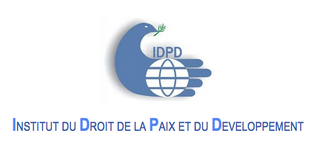 W
WThe Institute of the Right of Peace and Development is a French research institute in the field of international law located in Nice, France.
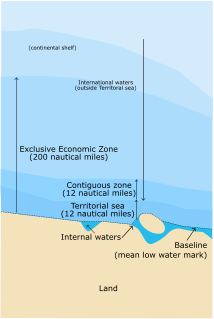 W
WAccording to the United Nations Convention on the Law of the Sea, a nation's internal waters include waters on the side of the baseline of a nation's territorial waters that is facing toward the land, except in archipelagic states. It includes waterways such as rivers and canals, and sometimes the water within small bays.
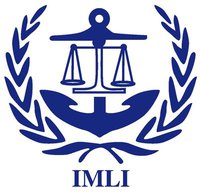 W
WThe IMO International Maritime Law Institute (IMLI) was established in 1988 under the auspices of the International Maritime Organization, a specialised agency of the United Nations. Its mission is to train specialists in maritime law. The Institute is currently headquartered in Malta, on the campus of the University of Malta.
 W
WThe International Seabed Authority (ISA) is an intergovernmental body based in Kingston, Jamaica, that was established to organize, regulate and control all mineral-related activities in the international seabed area beyond the limits of national jurisdiction, an area underlying most of the world's oceans. It is an organization established by the United Nations Convention on the Law of the Sea.
 W
WThe International Ship and Port Facility Security (ISPS) Code is an amendment to the Safety of Life at Sea (SOLAS) Convention (1974/1988) on Maritime security including minimum security arrangements for ships, ports and government agencies. Having come into force in 2004, it prescribes responsibilities to governments, shipping companies, shipboard personnel, and port/facility personnel to "detect security threats and take preventive measures against security incidents affecting ships or port facilities used in international trade."
 W
WThe International Tribunal for the Law of the Sea (ITLOS) is an intergovernmental organization created by the mandate of the Third United Nations Conference on the Law of the Sea. It was established by the United Nations Convention on the Law of the Sea, signed at Montego Bay, Jamaica, on 10 December 1982. The Convention entered into force on 16 November 1994, and established an international framework for law over all ocean space, its uses and resources. The ITLOS is one of four dispute resolution mechanisms listed in Article 287 of the UNCLOS.
 W
WThe terms international waters or trans-boundary waters apply where any of the following types of bodies of water transcend international boundaries: oceans, large marine ecosystems, enclosed or semi-enclosed regional seas and estuaries, rivers, lakes, groundwater systems (aquifers), and wetlands.
 W
WA traffic separation scheme is an area in the sea where navigation of ships is highly regulated. Each TSS is designed to create lanes in the water with ships in a specific lane all travelling in (roughly) the same direction.
 W
WA mar presencial or heritage marine reserve is a zone of influence demarcated by a maritime country in the high seas adjacent to its exclusive economic zone (EEZ). The objective of this oceanopolitical concept or doctrine, is to signal to third parties where the coastal country's interests are, or could be directly involved.
 W
WPhilippines v. China, also known as the South China Sea Arbitration, was an arbitration case brought by the Republic of the Philippines against the People's Republic of China (PRC) under Annex VII to the United Nations Convention on the Law of the Sea concerning certain issues in the South China Sea, including the nine-dash line introduced by the Republic of China (Taiwan) since as early as 1947. An arbitral tribunal constituted under Annex VII of UNCLOS decided that the Permanent Court of Arbitration (PCA) would act as registry to the proceedings.
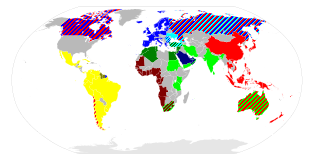 W
WPort state control (PSC) is an inspection regime for countries to inspect foreign-registered ships in port other than those of the flag state and take action against ships that are not in compliance. Inspectors for PSC are called PSC officers (PSCOs), and are required to investigate compliance with the requirements of international conventions, such as SOLAS, MARPOL, STCW, and the MLC. Inspections can involve checking that the vessel is manned and operated in compliance with applicable international law, and verifying the competency of the ship's master and officers, and the ship's condition and equipment.
 W
WPrize is a term used in admiralty law to refer to equipment, vehicles, vessels, and cargo captured during armed conflict. The most common use of prize in this sense is the capture of an enemy ship and her cargo as a prize of war. In the past, the capturing force would commonly be allotted a share of the worth of the captured prize. Nations often granted letters of marque that would entitle private parties to capture enemy property, usually ships. Once the ship was secured on friendly territory, she would be made the subject of a prize case, an in rem proceeding in which the court determined the status of the condemned property and the manner in which the property was to be disposed of.
 W
WThe Proliferation Security Initiative (PSI) is a global effort that aims to stop trafficking of weapons of mass destruction (WMD), their delivery systems, and related materials to and from states and non-state actors of proliferation concern. Launched by United States President, George W. Bush in May 2003 at a meeting in Kraków, Poland, the PSI has now grown to include the endorsement of 105 nations around the world, including Russia, Canada, the United Kingdom, Australia, France, Germany, Italy, Argentina, Japan, the Netherlands, Poland, Singapore, New Zealand, Republic of Korea and Norway. Despite the support of over half of the Members of the United Nations, a number of countries have expressed opposition to the initiative, including India, China and Indonesia.
 W
WThe Scottish Adjacent Waters Boundaries Order 1999 is a statutory instrument of the United Kingdom government, defining the boundaries of internal waters, territorial sea, and British Fishing Limits adjacent to Scotland. It was introduced in accordance with the Scotland Act 1998, which established the devolved Scottish Parliament.
 W
WA shipwreck is the wreckage of a ship that is located either beached on land or sunken to the bottom of a body of water. Shipwrecking may be intentional or unintentional. Angela Croome reported in January 1999 that there were approximately three million shipwrecks worldwide.
 W
WThe sinking of Chian-der 3 was an incident that occurred on 28 May 1986, when the Taiwanese-flagged trawler Chian-der 3 was detected, tracked, fired upon, set on fire and eventually sunk by the Mantilla-class patrol vessel PNA Prefecto Derbes of the Prefectura Naval Argentina, at a location 24 nautical miles outside the United Kingdom's Total Exclusion Zone, which covers a circle of 200 nautical miles from the centre of the Falklands Islands. Two Taiwanese fishermen were killed; four others were injured.
 W
WThe Sound Dues were a toll on the use of the Øresund, or "Sound" strait separating the modern day borders of Denmark and Sweden. The tolls constituted up to two thirds of Denmark's state income in the 16th and 17th centuries. The dues were introduced by King Eric of Pomerania in 1429 and remained in effect until the Copenhagen Convention of 1857. Tolls in the Great Belt had been collected by the Danish Crown at least a century prior to the establishment of the dues by Eric of Pomerania.
 W
WMV Tampa was a roll-on/roll-off container ship completed in 1984 by Hyundai Heavy Industries Co., Ltd. in South Korea for the Norway-based firm, Wilhelmsen Lines Shipowning.
 W
WIn late August 2001, the Howard Government of Australia refused permission for the Norwegian freighter MV Tampa, carrying 433 rescued refugees and 5 crew, to enter Australian waters. This triggered an Australian political controversy in the lead up to the 2001 federal election, and a diplomatic dispute between Australia and Norway.
 W
WThe term territorial waters is sometimes used informally to refer to any area of water over which a state has jurisdiction, including internal waters, the territorial sea, the contiguous zone, the exclusive economic zone and potentially the continental shelf. In a narrower sense, the term is used as a synonym for the territorial sea.
 W
WA traffic separation scheme or TSS is a maritime traffic-management route-system ruled by the International Maritime Organization or IMO. The traffic-lanes indicate the general direction of the ships in that zone; ships navigating within a TSS all sail in the same direction or they cross the lane in an angle as close to 90 degrees as possible.
 W
WThe Tulane Maritime Law Journal is the preeminent student-edited law journal in the field of Admiralty and Maritime Law. Published semi-annually, each issue of the Journal includes scholarly works written by academics, practitioners, and students concerning current topics in Admiralty and Maritime Law. In addition, the Journal publishes an annual section on Recent Developments in Admiralty and Maritime Law for the United States and the international community, as well as periodic symposia on relevant topical areas in the field and quantum, collision, and forum selection clause surveys every other year.
 W
WThe Turbot War was an international fishing dispute and bloodless conflict between Canada and Spain, and their respective supporters.
 W
WThe United States was among the nations that participated in the third United Nations Conference on the Law of the Sea, which took place from 1974 through 1982 and resulted in the international treaty known as the United Nations Convention on the Law of the Sea (UNCLOS). The United States also participated in the subsequent negotiations of modifications to the treaty from 1990 to 1994. The UNCLOS came into force in 1994. Although the United States now recognizes the UNCLOS as a codification of customary international law, it has not ratified it.
 W
WThe Wreck Removal Convention Act 2011 is an act of the Parliament of the United Kingdom. The act made provisions for the ratification of the Nairobi International Convention on the Removal of Wrecks.